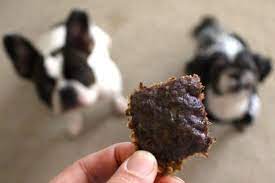Can Dogs Eat Beef Jerky? A Comprehensive Guide
Beef jerky is a delicious snack that consists of dried and seasoned meat, usually beef. It is high in protein, low in carbs, and has a long shelf life. Many people enjoy beef jerky as a convenient and satisfying treat, and some may wonder if they can share it with their furry friends. Can dogs eat beef jerky? The answer is: it depends. Not all beef jerky is created equal, and some types may be better or worse for your dog than others. In this article, we will explore the different types of beef jerky, their nutritional value and potential risks for dogs, and how to choose the best one for your pup.
Homemade Beef Jerky
The safest and healthiest type of beef jerky for dogs is the one that you make at home. Homemade beef jerky is easy to make and requires only a few ingredients: lean beef, salt, and optionally, some herbs or spices. To make beef jerky at home, you need to:
- Cut the beef into thin slices, about 1/4 inch thick. You can use any cut of beef, but leaner cuts are better, as they have less fat and moisture, which can spoil the jerky faster.
- Season the beef slices with salt and your choice of herbs or spices. You can use black pepper, rosemary, thyme, or any other dog-safe seasonings. However, you should avoid using onion, garlic, chili, or any other ingredients that can be harmful or irritating for dogs. You should also use salt sparingly, as too much salt can cause dehydration and kidney problems in dogs.
- Dry the beef slices in an oven, a dehydrator, or a smoker. You can use any method that suits your preference and equipment, but the general principle is to cook the beef at a low temperature (around 160°F) for several hours, until it is dry and chewy. You can check the doneness by bending a slice of jerky; it should not break or crumble, but it should not be too soft or moist either.
- Store the beef jerky in an airtight container in a cool and dry place. You can keep the jerky for up to two weeks at room temperature, or up to six months in the freezer.
Homemade beef jerky is the best option for dogs, as it contains pure protein and no harmful additives or preservatives. It can provide your dog with many health benefits, such as:
- Supporting muscle growth and repair
- Boosting energy and metabolism
- Improving skin and coat health
- Strengthening immune system and wound healing
- Promoting dental health and reducing plaque and tartar
However, you should still feed homemade beef jerky to your dog in moderation, as it is high in calories and can cause weight gain and obesity in dogs. You should also monitor your dog’s reaction to beef jerky, as some dogs may be allergic or intolerant to beef or some of the seasonings. If your dog shows any signs of distress, such as vomiting, diarrhea, itching, or swelling, stop feeding them beef jerky and contact your vet.
Human Beef Jerky
Human beef jerky is not suitable for dogs, as it contains high levels of sodium, sugar, spices, and artificial ingredients that can be toxic or unhealthy for dogs. Human beef jerky is made for human taste buds, not for canine nutrition, and it can cause many problems for your dog, such as:
- Dehydration and kidney damage: Human beef jerky is very salty, as salt is used to preserve and flavor the meat. However, dogs do not need as much salt as humans, and too much salt can cause dehydration and kidney damage in dogs. Salt can also increase blood pressure and cause heart problems in dogs. Symptoms of salt poisoning in dogs include excessive thirst, urination, vomiting, diarrhea, seizures, and coma.
- Toxicity and organ damage: Human beef jerky may contain ingredients that are toxic to dogs, such as onion, garlic, soy sauce, and nitrites. Onion and garlic can cause damage to the red blood cells and lead to anemia and organ failure in dogs. Soy sauce can cause sodium poisoning and liver damage in dogs. Nitrites are used to preserve and color the meat, but they can also form nitrosamines, which are carcinogenic and can cause cancer in dogs.
- Digestive issues and allergies: Human beef jerky may also contain ingredients that can cause digestive issues and allergies in dogs, such as sugar, spices, and artificial flavors and colors. Sugar can cause dental decay, obesity, and diabetes in dogs. Spices can cause irritation and inflammation of the gastrointestinal tract and skin in dogs. Artificial flavors and colors can cause allergic reactions and behavioral problems in dogs.
Therefore, you should avoid feeding human beef jerky to your dog, as it has no nutritional benefits and many potential risks for your dog’s health. If your dog accidentally eats some human beef jerky, you should watch for any signs of distress and contact your vet if necessary.
Dog-Formulated Beef Jerky
Dog-formulated beef jerky is a better alternative than human beef jerky, but still not as good as homemade beef jerky, for dogs. Dog-formulated beef jerky is made specifically for dogs, using natural sources of protein and low sodium levels. It is also free of harmful ingredients like onion, garlic, soy sauce, and nitrites. However, it may still contain some additives or preservatives that are not necessary for dogs, such as glycerin, sorbic acid, or citric acid. These ingredients are used to improve the texture, flavor, or shelf life of the product, but they may also cause some side effects or allergies in dogs.
Dog-formulated beef jerky can be a convenient and tasty treat for dogs, as it is easy to buy and store, and has a long shelf life. It can also provide some of the same health benefits as homemade beef jerky, such as protein, vitamins, and minerals. However, you should still feed dog-formulated beef jerky to your dog in moderation, as it is high in calories and can cause weight gain and obesity in dogs. You should also check the ingredients list and choose products with natural and minimal ingredients. You should also monitor your dog’s reaction to dog-formulated beef jerky, as some dogs may be allergic or intolerant to some of the ingredients. If your dog shows any signs of distress, such as vomiting, diarrhea, itching, or swelling, stop feeding them dog-formulated beef jerky and contact your vet.
Conclusion: Can Dogs Eat Beef Jerky?
Beef jerky can be a safe and healthy treat for dogs, as long as it is made with lean beef and minimal salt and seasonings. Homemade beef jerky is the best option for dogs, as it contains pure protein and no harmful additives or preservatives. Human beef jerky is the worst option for dogs, as it contains high levels of sodium, sugar, spices, and artificial ingredients that can be toxic or unhealthy for dogs. Dog-formulated beef jerky is a better alternative than human beef jerky, but still not as good as homemade beef jerky, for dogs, as it may still contain some additives or preservatives that are not necessary for dogs.
Whatever type of beef jerky you choose for your dog, you should feed it to them in moderation, as it is high in calories and can cause weight gain and obesity in dogs. You should also monitor your dog’s reaction to beef jerky, as some dogs may be allergic or intolerant to beef or some of the seasonings. If your dog shows any signs of distress, such as vomiting, diarrhea, itching, or swelling, stop feeding them beef jerky and contact your vet. By following these tips and advice, you can ensure your dog’s health and happiness.
FAQS
Q: What happens if my dog eats beef jerky?
This depends on the type and amount of beef jerky your dog eats. Homemade beef jerky without salt or spices is generally safe for dogs in small amounts, as it provides protein and other nutrients. However, human beef jerky or commercial dog jerky may contain high levels of sodium, sugar, spices, and artificial ingredients that can be harmful or toxic for dogs. These ingredients can cause dehydration, kidney damage, toxicity, organ damage, digestive issues, and allergies in dogs. If your dog eats a large amount of beef jerky or shows any signs of distress, such as vomiting, diarrhea, excessive thirst, urination, or seizures, you should contact your vet immediately
Q: Is human beef jerky safe for dogs?
Q: Can dogs eat Jack Link’s beef jerky?
Q: Can dogs eat wild bills beef jerky?
No, dogs cannot eat wild bills beef jerky, as it is another brand of human beef jerky that is not suitable for dogs. Wild bills beef jerky contains high levels of sodium, sugar, spices, and artificial ingredients that can be harmful or toxic for dogs. These ingredients can cause dehydration, kidney damage, toxicity, organ damage, digestive issues, and allergies in dogs. Wild bills beef jerky is especially dangerous for dogs due to its inclusion of onion and garlic powder, which can cause damage to the red blood cells and lead to anemia and organ failure in dogs.
Q: Can dogs eat beef jerky?
Yes, dogs can eat beef jerky, as long as it is made with lean beef and minimal salt and seasonings. Homemade beef jerky is the best option for dogs, as it contains pure protein and no harmful additives or preservatives. However, you should still feed beef jerky to your dog in moderation, as it is high in calories and can cause weight gain and obesity in dogs.
Q: Why is human beef jerky bad for dogs?
Human beef jerky is bad for dogs, as it contains high levels of sodium, sugar, spices, and artificial ingredients that can be toxic or unhealthy for dogs. These ingredients can cause dehydration, kidney damage, toxicity, organ damage, digestive issues, and allergies in dogs. Therefore, you should avoid feeding human beef jerky to your dog, as it has no nutritional benefits and many potential risks for your dog’s health.
Q: What are the benefits of beef jerky for dogs?
Beef jerky can provide many health benefits for dogs, such as:
- Supporting muscle growth and repair
- Boosting energy and metabolism
- Improving skin and coat health
- Strengthening immune system and wound healing
- Promoting dental health and reducing plaque and tartar
Q: How do I make homemade beef jerky for dogs?
To make homemade beef jerky for dogs, you need to:
- Cut the beef into thin slices, about 1/4 inch thick. You can use any cut of beef, but leaner cuts are better, as they have less fat and moisture, which can spoil the jerky faster.
- Season the beef slices with salt and your choice of herbs or spices. You can use black pepper, rosemary, thyme, or any other dog-safe seasonings. However, you should avoid using onion, garlic, chili, or any other ingredients that can be harmful or irritating for dogs. You should also use salt sparingly, as too much salt can cause dehydration and kidney problems in dogs.
- Dry the beef slices in an oven, a dehydrator, or a smoker. You can use any method that suits your preference and equipment, but the general principle is to cook the beef at a low temperature (around 160°F) for several hours, until it is dry and chewy. You can check the doneness by bending a slice of jerky; it should not break or crumble, but it should not be too soft or moist either.
- Store the beef jerky in an airtight container in a cool and dry place. You can keep the jerky for up to two weeks at room temperature, or up to six months in the freezer.
Q: How much beef jerky can I feed my dog?
The amount of beef jerky you can feed your dog depends on your dog’s size, weight, age, and activity level. As a general rule, you should not feed more than 10% of your dog’s daily calorie intake from treats, including beef jerky. For example, if your dog needs 1,000 calories per day, you should not feed more than 100 calories from treats. You can check the calorie content of beef jerky on the label or online, but it is usually around 116 calories per ounce. Therefore, you should not feed more than one ounce of beef jerky to your dog per day. You should also adjust the amount of your dog’s regular food accordingly, to avoid overfeeding and obesity.
Related Posts
Are Dogs Allowed In CVS?
March 22, 2024• Dog
Are Dogs Allowed in Duane Reade?
March 22, 2024• Dog
Natural Dewormers for Dogs: Safe and Effective
March 15, 2024• Dog, Dog Health
How Do I Comfort My Dog After Neutering?
March 6, 2024• Dog, Dog Health
Dog Rubs Face on Carpet: A Guide to Why
March 5, 2024• Dog














